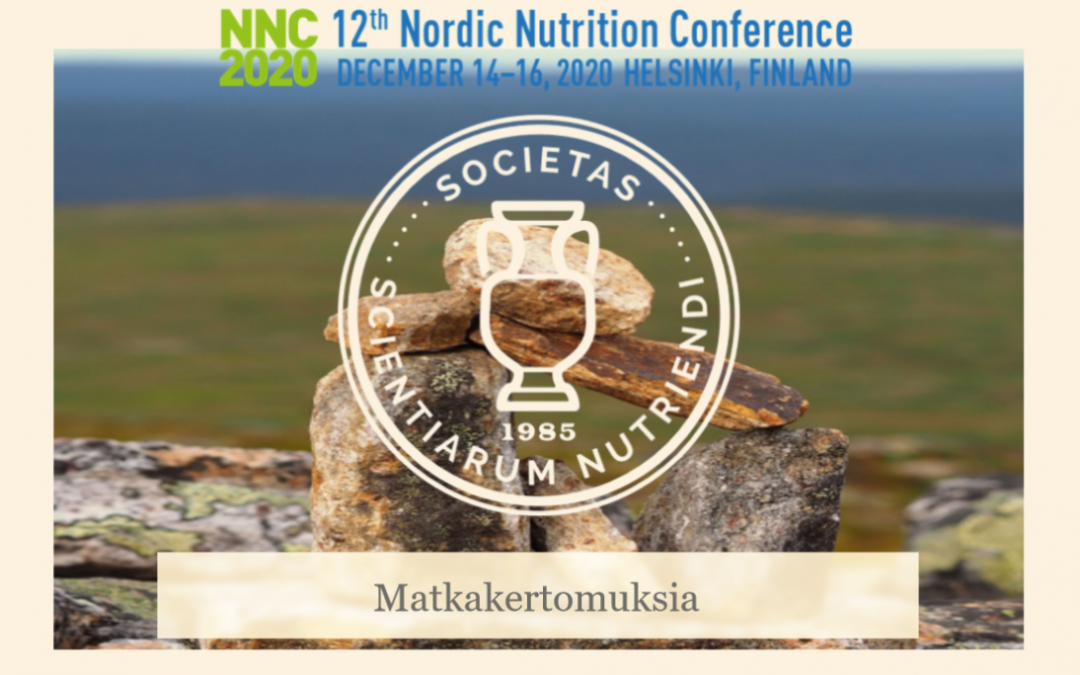Suomen ravitsemustieteen yhdistys jakaa jäsenilleen matka-apurahoja, joiden tarkoituksena on tukea ja edistää ravitsemustieteellistä tutkimusta ja julkaisemista. Vuonna 2020 kaikki matka-apurahat kohdistettiin NNC2020 konferenssin osallistumismaksuihin ja koska apurahoja myönnettiin niin monta, perinteisten matkakertomusten sijaan apurahansaajia pyydettiin kertomuksissaan ensisijaisesti esittelemään omaa tutkimustaan.
Faranak Halali, M.Sc., Nutrition Sciences, Tabriz University of Medical Sciences,
Doctoral student in clinical nutrition, Institute of public health and clinical nutrition, Faculty of health sciences, University of Eastern Finland
1. Background and aims of the research
Finland has higher than the European average of overweight and obesity prevalence, and the prevalence is particularly high among working-age population. Despite huge ongoing efforts to lose weight, the success rates of weight loss and long-term maintenance of the lost weight remain low. The overall aim of my doctoral research is to increase understanding of factors related to weight management (WM) as well as to find out how they are related to the success of WM and risk factors of type 2 diabetes. I expect that the findings would broaden the outlook of WM among Finnish adults, help identify behavioral and psychological determinants of WM and ultimately assist in achieving long-term success in WM.
In my research work, I use three different datasets: i) two cross-sectional datasets from the KULUMA project (Consumers on the Weight Management Market), ii) an intervention dataset from the StopDia project (Knowledge-based solutions to prevent type 2 diabetes).
The specific aims of my research are to study:
I) Motivators, barriers and strategies of WM in a real-life setting among Finnish adults (KULUMA data) and to examine whether they associate with socio-demographic (e.g., age and gender) and weight-related (e.g., weight loss attempts during lifetime) characteristics
II) Relationship between repeated weight loss attempts during lifetime and eating behavior tendencies among Finnish adults (KULUMA data)
III) Relationship between lifetime history of WM and metabolic, psychological, and behavioral risk factors of type 2 diabetes (StopDia data)
IV) Satisfaction with current weight and its psycho-behavioral and lifestyle-related determinants among Finnish adults with varied history of WM (KULUMA data)
2. Poster presentation for the NNC 2020
The title of my poster presentation for the Nordic Nutrition Conference (NNC) 2020 was ‘Weight management strategies and psycho-behavioural characteristics in Finnish adults satisfied or dissatisfied with their weight’, which is part of the findings related to the specific aim IV. Participants were 83 Finnish adults aged 18-65 years, who had previous experience with WM, were ready to make effort for WM (≥ 6 on a 10-point scale), and were not wishing to gain weight. We found that 66% of participants (55/83) were dissatisfied with their current weight. Among strategies of WM, ‘physical activity’ was the only strategy that differed significantly between weight-satisfied and weight-dissatisfied individuals as those who were satisfied with their weight used physical activity as a WM strategy more frequently than the weight-dissatisfied individuals. Weight-satisfied individuals had less rigid restraint of eating, less disinhibition of eating, and more nutrition self-efficacy, a profile that has been associated with more successful WM. In addition, weight-satisfied individuals reported more fiber intake than the weight-dissatisfied individuals did (27.2 g/day vs. 21.2 g/day). We concluded that strengthening individuals’ nutrition self-efficacy, adopting more flexible restraint of eating along with performing more frequent physical activity could be a favorable strategy to support WM and weight satisfaction among those dissatisfied with their weight.
3. Research team
I am conducting my PhD research at the Institute of public health and clinical nutrition at the University of Eastern Finland (UEF). My supervisors are adjunct professor, PhD Anja Lapveteläinen who is an expert in sensory and consumer science and adjunct professor, PhD Leila Karhunen who is the leader of the ‘Food Education and Eating Behavior’ research group with expertise in clinical nutrition and obesity and eating behavior research.
Other main collaborators for this research are: D.Sc., Teuvo Kantanen from the Department of Business (UEF), who was a principal investigator in the ‘KULUMA’ project; Professor Raimo Lappalainen from the University of Jyväskylä, who collaborated in the ‘KULUMA’ project; and Professor Jussi Pihlajamäki from the institute of public health and clinical nutrition (UEF), who was a principal investigator in the ‘StopDia’ project.
